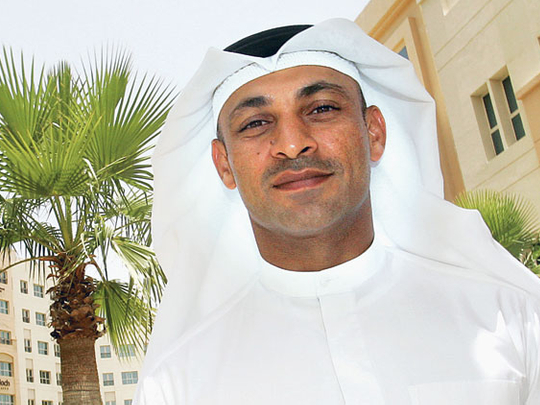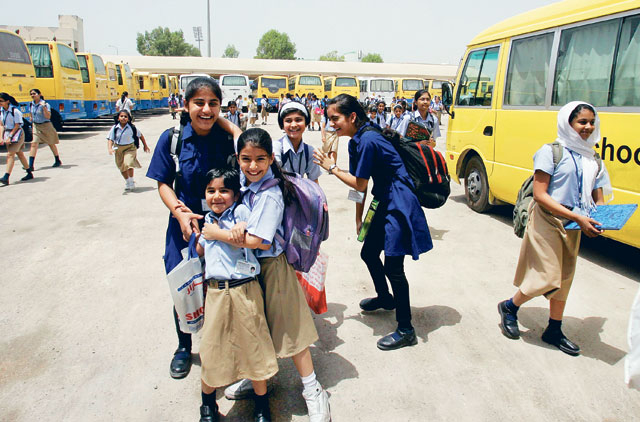
Dubai: Schoolchildren and parents won't be left at the mercy of mercenary business tactics that have been haunting Dubai classrooms recently, the education regulator has promised.
Breaking the silence after a powerful education group confronted the KHDA (Knowledge and Human Development Authority) to rethink its freeze on school fees, Dr Abdullah Al Karam, Chairman of the Board of Directors and Director-General, KHDA, categorically ruled out school fee hikes this school year. "We don't see a possibility. The reasons for it have ceased to exist," he said.
While the Ministry of Education has allowed some half a dozen schools to increase fees, Dr Al Karam clarified that private operators won't be allowed to act like "over-commercialised businesses" which put "maximising profit" above student care.
"There were some genuine cases in the past, but these were exceptions. Institutions have to follow systems, not exceptions. This is education, not retail shops," he said.
In an interview to XPRESS on May 23, Dr Al Karam said: "Profit-making cannot be the core business, the bottom line, of a school. Yes, it's a private school, but let's not always compare schools to a business. You can have that, but let's not lose sight of what a school's supposed to be.
"Schools' bottom line is fundamentally different; their ‘client base' is different. Their reason for existence is completely different - to provide quality education. Other services, facilities are add-ons.
"It's still - at the end of the day - a social service. That also applies to hospitals [for example]."
XPRESS has learnt that 50 schools had asked KHDA to approve higher tuition fees this school year, with many saying they needed to offset what they claimed were a steep rise in costs, especially land and building rents.
Schools' warning
A few schools had even warned that they would close shop unless authorities permitted the hikes. However, Dr Al Karam said schools cannot take such drastic steps single-handedly, or lightly. The KHDA would closely investigate school claims and involve "all stakeholders" before allowing managements to shut down or move classes, he said.
"You can't just say: ‘They [the landlord] increased rents, so we [as a school] will increase fees. Not so fast," Dr Al Karam said, adding that "You cannot transfer this [burden] to 500 families. Don't fix a problem with a bigger problem."
"We'll always try to help. Let's look at the [rental] agreement. Did you [as a school] go to the rent committee? Who's your landlord? Let's talk, be in dialogue."
The KHDA has "never allowed a school to relocate or move based on rent. There was only one [exception] , because the whole area was being redeveloped," he said, referring to the Dubai Modern High School, which moved from its former Al Safa campus to a new location in Nad Al Sheba in late 2009. The school had then announced it would raise fees by 90 per cent in two academic years at the new Dh200 million building.
Still, the KHDA will always seek to first arrange alternatives for students and parents facing an uncertain future. "We'll look at the quality of the school. Is it substandard; is there another quality school that can take over, give parents better value? You've got to give notice to parents," he said.
In any case, schools that own the premises, or landlords and other businesses won't be able to profit from a campus closure or relocation as the existing plots and buildings will be indefinitely reserved for schooling purposes only. Dr Al Karam said: "In general, we don't see the reason to change the status of a school land to a non-school land. It won't be allowed.
"It's not that easy. He [the landlord] has to convince us [the KHDA] there's no reason for a school to exist there any more. Schools are built on urban planning, in residential areas. You can't disrupt that, in any city. We'll coordinate jointly between us [KHDA and schools] and Dubai Municipality."
Rent index for schools
Some schools had approached KHDA for a fee hike citing increase in school building rents, but Dr Al Karam said that this won't be allowed as the KHDA and Real Estate Regulatory Authority are working on a rent index for school buildings. "We've been talking to Rera to identify an index. It'll take more time to develop. It's far more complicated with schools than normal apartments.
"You have to look at facilities, the community neighbourhood, etc," he said, without giving a time-frame.
Some schools had also reportedly maintained they needed extra income - on the back of higher fees - to offer attractive salary packages to teachers, but Dr Al Karam refuted this argument.
"The pay scale is one of the biggest chunks in school costs, besides rentals. This year, these two elements are not quite there. So, what's the schools' rationale to increase fees? Tell us, maybe there's something we're missing. But so far we don't see the possibility, generally speaking. We don't see the old reasons from the ‘boom' years."
The requests for fee hikes in Asian schools had mainly come from the GEMS Education Group, founded and chaired by prominent Indian businessman Sunny Varkey, who had written to the KHDA explaining "issues which critically affect private schools in Dubai, particularly existing old schools".
Great service
Varkey had stated: "These schools have served the community of Dubai for as many as 40 years, charging Dh5,000 average fee that are significantly lower than the Dh15,000 and above average fee charged by new schools for the same product with no track record of delivering quality education in the UAE."
The letter added: "If the authority had taken the right decision three years back, this problem could have been avoided. Hence, we reiterate that this is the time that your support must move to support the old schools, by approving them in implementing fee restructuring over the next three to five years, so that our schools are in line with the new schools."
Dr Al Karam declined to join issue with the Gems Group owner, but said: "I don't want to generalise private schools. Some managements only look at the bottom line, maximising profits. Others don't.
"There's been some great work done, philanthropically too. Parents should trust the system, not individuals. The system stays, individuals come and go," Dr Al Karam continued.
"Public perception is not about who said what, but who is doing what. Ultimately, the public will know that, they'll find out."
Teachers' salaries
A base salary for school teachers is "under discussion" at various levels, said Dr Abdullah Al Karam. He said the education and labour ministries are in talks to introduce a minimum package for teachers.
"I think it's a good concept. But there are challenges: the diversity of curricula, who'll issue teacher licences, provide training," he said.
It may be noted that expatriate teachers, especially from Asian schools, earn as little as Dh2,000 a month.
Red Tape
The KHDA has downplayed concerns that degrees awarded by local campuses of international universities in Dubai "free zones" are generally not accredited by the UAE Ministry of Higher Education and Scientific Research. The degrees are, nevertheless usually accredited by the authorities in the institute's home country and "recognised and approved" by the KHDA. "The proof that this two-tier (KHDA and the Ministry) system is working is that graduates are qualified, they're getting jobs," Dr Al Karam said.
Around 18,000 students attend tens of foreign colleges in purpose-built education zones such as Dubai International Academic City and Dubai Knowledge Village.
Quality Control
Dubai schools with a track record of providing "quality education" may be given a three-year "breather" from inspections by the KHDA, Dr Abdullah Al Karam said.
Its Dubai Schools Inspections Bureau (DSIB) has twice rated schools into four categories - outstanding, good, acceptable and unacceptable. However, schools that follow a different academic calendar - mostly the Indian and Pakistani schools - have not yet been rated a second time.
"After three years of inspections, we'll have accumulated data, established trends. We follow through every three months for unacceptable schools, but we could give good outstanding schools a breather for three years," Dr Al Karam said.
Meanwhile, ‘unacceptable' schools will not be allowed to admit more students until they raise their standards, he said. In effect, such schools will also be prevented from hiking their fees.













